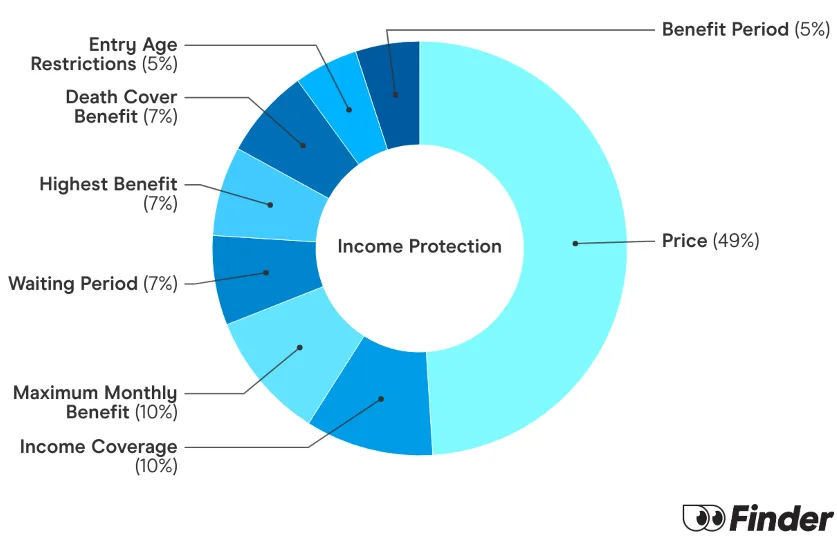Key takeaways
- Income protection insurance is often an add-on to the insurance you get in your super.
- Superannuation income protection can pay 75% of your income if illness or injury temporarily stops you from working.
- It is often cheaper than buying outside of super because it is not tailored to your needs.
How does superannuation income protection work?
When you open a super account, insurance is typically added automatically. Unlike taking out income protection directly from the insurer or through a broker, premiums are deducted directly from your super balance and you usually don't have to undergo any medical checks.

Income protection
Some superannuation funds offer income protection to their members. It's sometimes available as an add-on in addition to life cover and TPD insurance. It's designed to cover short-term injuries and illnesses and usually pays 75% of your income if you're temporarily unable to work due to illness or injury.
Life insurance and TPD
Most super funds will automatically provide you with life cover and total and permanent disability insurance (TPD). They are tailored towards covering long-term injuries and death. The former, commonly referred to as life insurance, pays out in the event of your death. The latter pays you a lump sum if you are unlikely to work again because you are permanently disabled.
Finder survey: How many Australians have life insurance inside their super?
| Response | |
|---|---|
| No | 44.68% |
| Yes | 42.61% |
| I don't know | 12.7% |
Income protection through super: Pros and cons
Pros
- Premiums may be cheaper
- Automatic acceptance – no medical checks
- Convenient – less paperwork
- Premiums don't come out of your bank balance
Cons
- Policies are bought in bulk so are not tailored to your needs
- Less flexibility on your policy
- Premiums reduce your retirement savings
- If you change funds, your cover can end
Standalone income protection insurance vs superannuation income protection
| Standalone income protection insurance | Superannuation income protection | |
|---|---|---|
| How do I buy a policy? | Direct from an insurer or through an insurance broker | Automatically included when you take out super or added on |
| What's the application process like? | Apply online or over the phone. You will likely be asked questions about your health and medical history as part of the underwriting process | Guaranteed acceptance on shared terms others get through group income protection cover |
| How much will it pay me? | Up to 85% of your monthly income | Up to 75% of your monthly income |
| How do I pay the premiums? | Out of your bank account | Directly from your super account |
FAQs answered by financial adviser Brenton Tong

"Income protection in super must meet the superannuation rules, so there are some features that go missing. The main features that you won't get in a super owned income protection policy are things such as:
- Accident cover
- Carers allowance
- Travel allowance
- Rehabilitation cover
"Superannuation has a tightly defined 'condition of release' where the person claiming must be either fully disabled or meet a temporary incapacity definition. Cover outside of this area (e.g. travel allowance that will cover your expense to get home if you're sick or provide additional money for a carer to travel to see you) isn't allowed in super.
"Further, while not due to the superannuation rules, many default insurances in super are less comprehensive to keep cost down. A very typical illustration of this is the benefit period – how long the insurer will pay you if you're not able to work. While you can get cover up to 65 years of age, it's common for a super policy to only cover you for 5 years by default. This is often due to it being default cover, which is cover you don't ask for but are given. It's a good idea to check, and if you want cover for longer, apply for it."
"If it's an active super fund (i.e. you're putting money into it), then you need to contact the super company to cancel your insurances. Most will require something in writing, and it may be just a letter or you have to complete a form.
Always be mindful if you're cancelling an insurance policy that there is a possibility that you may not be able to get it back if you want it again in the future. If you've had any medical conditions or should your health change in even modest circumstances, it may affect any future application for insurance."
"Just because your super fund is paying for your insurance, doesn't mean that it's free. Since we often don't pay too much attention to our super, having a pool of funds that you don't feel a depth of ownership over paying will bring comfort to some people.
"However, when it's time to cash in your super, you'll notice that your fund is a lot lower. Consider the cost of what you're paying for and ensure that it's appropriate for your needs. Shop around and see if there is a cheaper alternative out there for you.
"Income protection is tax deductible in your own name, so it's just as tax effective to pay for it yourself than it is to put it in your super – so if you have the cash flow to do so, paying for it out of your own bank account can be advantageous long term as it will allow your superannuation balance to grow faster. However, if money is tight, having your super pay for it ensures that you're less likely to cancel it when times are tough – which is likely the time when you need it the most."
Brenton Tong is the managing director and senior financial adviser at Financial Spectrum.
Advantages of superannuation income protection
- Premiums may be cheaper. Because super funds buy income protection policies in bulk, the premiums are less than standalone policies.
- Automatic acceptance. You will usually be automatically accepted for income protection through your super fund and won't have any medical checks.
- It can be convenient. There's usually less paperwork and premiums are automatically deducted from your super balance, not your bank account, so you don't need to worry about having enough money in your account.
Disadvantages of superannuation income protection
- You might not be getting the amount of cover you need. You might only be able to get cover for up to 2 years with some super policies (as opposed to up to the age of 65 with some standalone policies).
- Less flexibility on your policy. A standalone policy can give you more options – for example, a greater choice of waiting and benefit periods or additional benefits for specific injuries such as rehabilitation.
- Premiums are paid through your super. Premiums are funded from your super fund balance and therefore eat into your future retirement fund.
- Cover can end. If you change super funds or your super account becomes inactive, your cover may end, leaving you with no insurance.
Claiming income protection through super
If you need to lodge an income protection claim through your super, you will generally need to follow these steps:
Contact your insurer
Contact your insurer to let them know you wish to make a claim. If you don't know them, contact your super fund first. The insurer will provide you with a claim form.
Fill out the claim form
Fill out a claim form with the details of your illness or injury. Your doctor will be required to complete some sections to provide evidence that you are temporarily unable to work. Provide any supporting documentation requested from your super fund, such as proof of ID, medical reports and proof of your pre-disability earnings.
Submit your claim
Once you've filled out the claim form, submit it to your insurer. Your insurer should respond within 10 business days. Keep in mind that once your claim has been accepted, you will still have to serve a waiting period before you are able to receive benefits. This is commonly around 30 days but can be as long as 90 with some funds.
Keep in mind that to receive a benefit, you must satisfy 2 criteria:
- You must meet the definition of disability outlined in your income protection policy.
- You must meet the super fund's temporary incapacity definition so that your income protection benefits can be released to you by the fund.
Frequently asked questions about superannuation income protection
Alternatives to superannuation income protection
Income protection from your superannuation is an easy and affordable way to protect your income if you're unable to work due to illness or injury. However, it does have its limitations. If the conditions of income protection from your super are too restrictive, you should consider looking at a standalone income protection insurance policy instead.
Compare direct income protection insurance options
Compare other products
We currently don't have that product, but here are others to consider:
How we picked theseFinder Score - Income Protection
Income Protection is a little complicated and a lot overwhelming. That's why we made the Finder Score, to make it easier to compare Life Insurance products against each other. Our experts analysed over 12 products and gave each one a score rank out of 10.
But a higher score doesn't always mean a product is better for you. Your situation is unique, so your policy choice will be too. Don't think of Finder Score as the final word, but as a good place to start your life insurance comparison.
Speak to an insurance specialist to help you find personalised cover
More guides on Finder
-
HCF Income Protect Insurance
Wondering if HCF Income Protection Insurance is right for you? We break down what’s covered, what’s not and whether it offers good value.
-
TAL Income Protection Insurance review
Learn the built-in benefits of TAL income protection to understand how it could work for you. Compare features and get a quote today.
-
Sick leave Australia: What you’re entitled to and when
Find out why income protection is an important tool to combine with your entitled sick leave.
-
Cost of income protection in Australia
Income protection costs can range from around $50 to $160+.
-
Sole trader income protection insurance
Income protection for sole traders provides financial support, via a monthly payment, if you’re unable to work due to illness or injury.
-
Income Protection Insurance vs Mortgage Protection
Does income protection provide the same thing as mortgage protection? Read on and compare.
-
Suncorp Income Protection Insurance Review
Receive income cover for illness or injury with Suncorp Income Protection.
-
Income protection insurance calculator
Find out how much your income protection insurance policy will pay out in the event of a claim. Receive quotes for income protection and apply securely.
-
NobleOak Income Protection Insurance review
NobleOak has been offering personal insurance solutions direct to Australians for over 137 years. Discover the benefits and features available on the NobleOak Income Protection policy and make a secure enquiry for cover.
-
Best income protection, Australia
Looking for the best income protection insurance but not exactly sure where to start? Compare the Finder Awards 2025 insurance winners.

